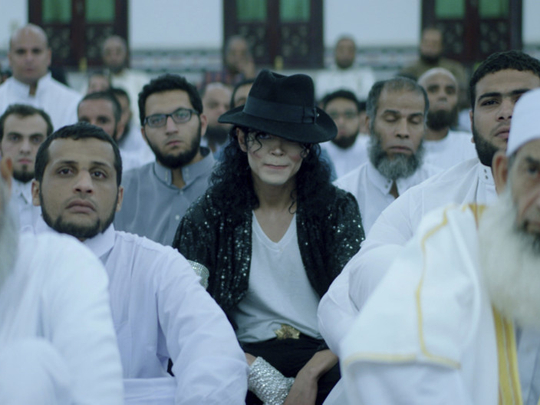
Cairo: An Egyptian ultraconservative Muslim preacher hears on his car radio news of the death of Michael Jackson, the pop singer he idolised in his teens, and he becomes so distraught he crashes his car.
The news of the passing of the King of Pop is the start of a crisis of conscience for Shaikh Khalid Hani, the main character of the movie “Shaikh Jackson,” Egypt’s first feature film to focus on the religious movement known as Salafis, followers of one of the strictest interpretations of Islam.
It follows Shaikh Hani, a Salafi, as his love for Michael Jackson throws him onto a bumpy journey to discover his own identity, mirroring how Egypt’s conservative society is torn between its Islamic and Arab traditions and Western culture in an age when television, telecommunications and social media bring together people and cultures from all corners of the world.
“I no longer cry while I am praying. That means my faith is faltering,” Hani confides to a female psychiatrist in one scene. Crying while praying, he explains, reflects his fear of God.
The film goes beyond examining Salafis, says the director, Amr Salama. “It’s about humanity. ... It tells you that one’s identity is not a single dimension or an unchangeable thing,” he told The Associated Press just days before “Shaikh Jackson” premiered in the Toronto Film Festival earlier this month.
It’s a journey Salama has some experience in: He was a huge Jackson fan in his teens and then became Salafi during his university years, before moving away from the movement.
Salafism is one of the most closed, uncompromising visions of Islam. Its doctrine is primarily built around what its followers believe is emulation of the actions of the Prophet Mohammad. They are easily recognised by their chest-long beards and robes that reach to just below the knees. They shun music, film and dance and outside influences seen as decadent. Salafi women wear the all-covering niqab, including veils over their faces.
Followers view life as little more than a transitional phase and are contemptuous of worldly pleasures. Immortality in heaven is their chief goal.
When Hani goes to the psychiatrist - who he thought by her ambiguous name was a man - he asks her to put on a headscarf during their sessions. She refuses, and throughout their talk, he can’t look at her. When she asks him the last thing that made him feel alive, his response comes from Salafi doctrine: “I bought my shroud and wrote my will.”
He occasionally sleeps under his bed, convinced that it is the closest thing to being inside a grave, thus a reminder of his mortality.
But Jackson’s death revives in Hani the obsession with the singer he had in his teens, when he imitated the star’s look and dance moves. It earned him the nickname “Jackson,” but also the disapproval of his macho father.
“He is effeminate,” the father says of Jackson.
But Hani’s mother whispers to him, “He is the world’s best singer. But keep that as our little secret.”
When the mother dies young, Hani’s father turns into a serial womaniser and becomes violent, beating Hani for imitating his idol.
When the adult Hani discovers his own daughter - around six or seven - watching videos of Beyonce, he tears out the Wifi and denounces “dancing to the devil’s tune.”
In a scene many parents could sympathise with, their young daughter watches her parents with disapproving bemusement as they drive her to school, joyously singing a religious hymn they heard on the day they met. Embarrassed, she asks her father to drop her off far from the school gate.
The movie builds Salama’s reputation as a director willing to take on some of Egypt’s thorniest issues. His 2014 “Excuse My French” dealt with the forms of subtle discrimination that Egypt’s minority Christians face, while the 2011 “Asmaa” portrayed the social stigma endured by those who are HIV positive.












